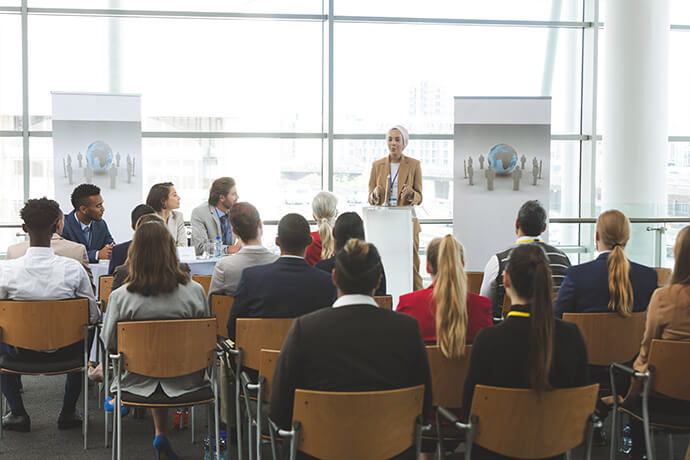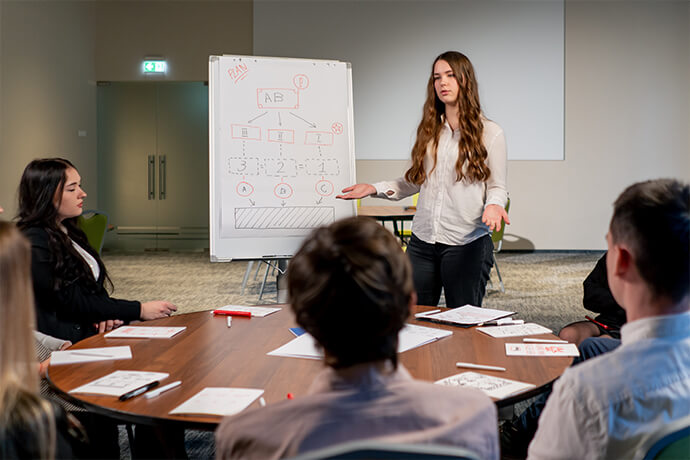 SPEAKERS
SPEAKERS
 TOPICS
TOPICS
Master conference event planning with our detailed guide. From idea to implementation, learn all aspects for success.

Conference organizing can be a challenging but gratifying task. Regardless of whether you are a professional event planner or someone who takes on the task for the first time, careful planning is a necessity to prevent conference failure.
With this detailed guide, you can get to know all the aspects of conference organization, starting from the idea and ending with its implementation.
Let’s start our journey in mastering conference event planning.
Planning a conference requires the orderly planning and running of an event in which groups of people with similar interests gather to share knowledge, ideas, and experiences about a given topic. This process does not change regardless of the fact that it is a business conference, an academic symposium or an industry summit. If conducted well, it will help raise the profile of your organization, provide networking opportunities and contribute much to professional development.
Below is a step by step procedure for planning a successful conference:
Before delving into the logistical aspects, it is important to define the main objectives of your conference. Ask yourself: Why is the event held? Who is your target audience? What should the attendees benefit from? Setting goals will be the basis of every decision you make during planning.
Venue selection is a key area of the conference planning process. Think about the expected size of your audience, whether an event is a particular type and how easy to gain access. Make sure that the location provides proper amenities, including breakout rooms, audiovisual equipment and sufficient chairs. Reach an agreement for a favorable contract that sets out all necessary details, such as dates, costs, and compensation.
A well-developed timeline is the basis of effective conference planning. You should prepare a detailed timetable that covers all the steps leading up to and even after the conference. In this timetable, you need to plan the deadlines for finding speakers, marketing the event, and coordinating logistics. You can revise the timetable periodically as the date of the conference draws near.
To have a successful conference, it is important to have lively and educated speakers. Select people who are specialists in the area, captivating speakers, and have something important to say. Contact them early enough to know their availability and specific needs. Be specific in terms of presentation structures, time frames and additional requirements.
Focus on the site management logistics as the conference date gets closer. Contact the vendors, caterers and venue staff to ensure a seamless flow of proceedings. Having a team dedicated to registration, solving queries, and troubleshooting any problems would be super beneficial. You should also carry out a full walkthrough of the site to identify critical locations and address possible logistical issues.
Use technology to improve the conference experience. Offer Wi-Fi, use event apps for schedules and updates, or think about live streaming or recording sessions in case of remote participants. Adopt innovations that have the capability to improve your entire conference.
After the end of the conference, you should make a comprehensive evaluation to get feedback from participants, speakers and sponsors.You should analyze the actual numbers of attendees, survey results, and overall event performance in contrast to your original goals. With using this knowledge to highlight weaknesses and strengths, you may lead the way for more successful conferences in years to come.

Conferences are essential events that unite professionals, experts, and aficionados in the exchange of concepts, knowledge sharing and cooperation in a specific field. The success of a conference is not just limited to logistical accomplishments, it also lies in creating the future for organizations, industries and also individuals.
Here are the critical aspects of a successful conference and its effects on different stakeholders:
Professional and Industry Advancement: A well-organized conference is instrumental in the development of both professionals and industries. They learn about the most recent innovations and techniques through keynote presentations, workshops, and panel discussions. Armed with this knowledge, they can introduce positive reforms in their work environments, hence driving the advancement of their individual fields.

If you want to plan and execute a successful conference and execution, you should be aware of the importance of careful and detailed planning. Every step, from defining goals to attracting participants and smoothly running logistics, is important for the event's overall success. An effective conference promotes the flow of knowledge and professional growth, along with unmatched networking. Conferences act as catalysts for positive change in organizations and industries; therefore, the success of these conferences cannot be overemphasized. Following this detailed guide, organizers of conferences can develop effective events that will leave a legacy in their sector.